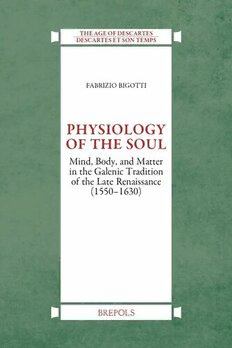
Physiology of the Soul: Mind, Body and Matter in the Galenic Tradition of Late Renaissance (1550-1630) (Age of Descartes) (The Age of Descartes, 3) PDF
368 Pages·2019·3.486 MB·English
Most books are stored in the elastic cloud where traffic is expensive. For this reason, we have a limit on daily download.
Preview Physiology of the Soul: Mind, Body and Matter in the Galenic Tradition of Late Renaissance (1550-1630) (Age of Descartes) (The Age of Descartes, 3)
Description:
In spite of the commonly held opinion according to which Galen's authority was gradually superseded by Vesalius and his followers, a close look at the influence that Galen's psychological works exerted on physicians and philosophers of the early modern period reveals quite a different picture. Not only were Galenists often keen to embrace the new anatomical discoveries, eventually they even contributed to shaping a series of new analytical, practical and experimental tools that started an in-depth transformation of the traditional rationale, with far-reaching and unexpected consequences in domains such as theory of matter, philosophical anthropology and medical experimentation. Through the lens provided by mental disease and its connection to the soul, a new concept of the body and the human animal ultimately emerges: a concept that accompanies the development of early modern ideas on subjectivity and the self.
See more
The list of books you might like
Most books are stored in the elastic cloud where traffic is expensive. For this reason, we have a limit on daily download.
